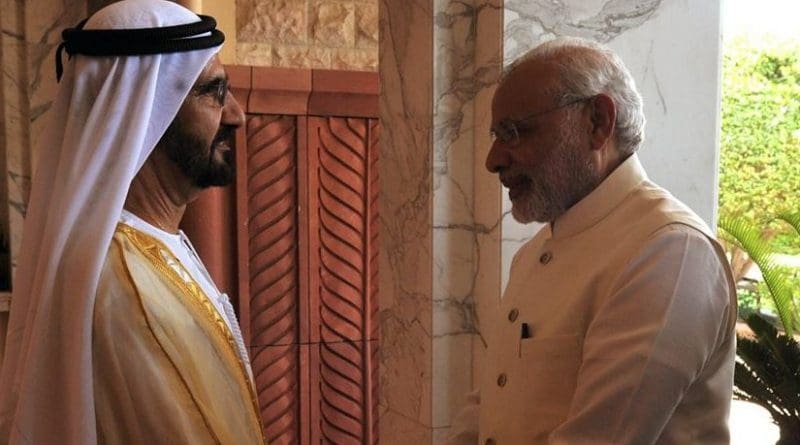Valentine Bonhomie: Strengthening Ties Between India And UAE – Analysis
By Adil Rasheed
In the wake of the ongoing turmoil in the global economic and geopolitical order, the six Sunni monarchies of the Persian Gulf (that constitute the Gulf Cooperation Council or GCC) have been proactive in calibrating new geostrategic alignments for safeguarding and promoting their security and economic interests.
These states are uneasy about the partial reduction in US troops from the region under the so-called ‘Asia pivot’ strategy, the lifting of international sanctions against arch-enemy Iran, as well as the precipitous fall in oil prices due to a feared secular stagnation in Western economies.
More importantly, they are restive over the growing security threat posed by radical Islamism to their national security, emanating from such disparate forces like the Muslim Brotherhood, the jihadi-Salafists (like Al-Qaeda and the ISIS), the perceived support of Iran’s theocratic regime to disgruntled Shiite communities in the region such as in Yemen or Bahrain and now over other inimically extreme non-state actors based in the Af-Pak region.
Among these six states, the relatively young leadership of the UAE has perhaps been the most forward-thinking and dynamic. Along with Saudi Arabia, Emirati leaders have been seeking to raise a new geo-strategic security and economic architecture for the Gulf States with their visionary ‘Look East’ policy, in which India features prominently.
With current Indian Gross Domestic Product (GDP) growth rate at over 7 percent per annum being the envy of all economies, the UAE is seeking to keep its economic wheels in motion by investing heavily in our country, a natural safe haven for the fast depleting sovereign wealth funds given the dramatic fall in oil prices for over a year and no immediate respite in sight.
Thus, the reality of India’s strong economic credentials, dynamic leadership, a tolerant and secular society as a well as a huge and buoyant market seems to have dawned on the UAE leadership, a realization spurred by Prime Minister Narendra Modi’s visit to the UAE in August last year, the first by an Indian premier after 34 years. Even during that groundbreaking visit, PM Modi and Crown Prince Sheikh Mohammed bin Zayed Al Nahyan had envisioned an increase in the annual bilateral trade volume by over 60% in the next five years.
It is noteworthy that in spite of the relative diplomatic lull for several decades, India has emerged as the UAE’s biggest trading partner while the Gulf nation is India’s third largest trading partner after the US and China. The UAE is also India’s second largest export destination. The annual bilateral trade is currently estimated around $60 billion.
The response to the PM’s trip last year has been the Abu Dhabi Crown Prince’s recent three-day visit to India in the second week of this month, the so-called ‘valentine bonhomie’ wherein the two sides signed as many as nine agreements on bilateral cooperation.
The significance of the visit lies in the fact that both countries elevated their relations to the level of “comprehensive strategic partnership” to which the Emirati leader added heft by agreeing to invest in India’s infrastructure, through the India-UAE Infrastructure Investment Fund, by allocating $75 billion for the same.
Again, the UAE’s Abu Dhabi National Oil Company (ADNOC) agreed to store crude oil in India’s 1.5 million tonnes-Mangalore strategic petroleum reserve using it as a wholesale storage capacity and sell to the Indian refiners whenever needed. Although the two countries could not conclude an agreement for civil nuclear energy cooperation during this visit, they signed a pact to cooperate in the field of space technology, with the UAE seeking India’s cooperation for its first unmanned inter-planetary expedition, which is slated for 2020.
The two sides also discussed the challenge posed by terrorist groups like the ISIS and emphasized the need to work closely to defeat terrorism. It is noteworthy that ahead of the Crown Prince’s visit, the rich Gulf state had reportedly requested India to send teams of Indian imams to train its preachers in using moderate Islam to check radicalisation in that country’s mosques at a time the ISIS’ radicalization is worrying Gulf states. “We will need to understand the context of the UAE’s request, but there is a lot the world can learn from the Indian interpretation of Islam,” Mahmood Madani, chief of India’s largest organisation of Islamic clerics, the Jamiat Ulema-e-Hind, reportedly stated in response to this news. “Our interpretation of Islam is very different from theirs, with a focus against hate and with humanitarian values.”
It is important to note that the UAE is home to around 2.6 million expatriate Indians, 60 percent of whom are blue collar workers. In addition, it is a major trading hub for Indian goods on their way to Europe, the US and Africa. With the Gulf state’s plans for building a major military bloc against terrorism, which involves mainly Sunni nations, suffering a setback due to strains in relations between major nations – Turkey and Egypt- and the recent Pakistani diffidence in coming to the GCC’s aid during the Yemen conflict, countries of the region are looking at the near abroad as well as beyond traditional religious and ethnic affiliations for bolstering national security and economic stability. This presents a great opportunity for India to play a more engaging and constructive role with Gulf States for the furtherance of its own larger strategic and trade interests.
*Dr. Adil Rasheed is an independent analyst working on West Asia. He can be reached at: [email protected]

